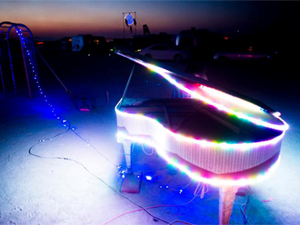



Date:04/06/16
 Google's newest machine learning project released its first piece of generated art, a 90-second piano melody created through a trained neural network, provided with just four notes up front. The drums and orchestration weren't generated by the algorithm, but added for emphasis after the fact.
Google's newest machine learning project released its first piece of generated art, a 90-second piano melody created through a trained neural network, provided with just four notes up front. The drums and orchestration weren't generated by the algorithm, but added for emphasis after the fact.
It's the first tangible product of Google's Magenta program, which is designed to put Google's machine learning systems to work creating art and music systems. The program was first announced at Moogfest last week.
Along with the melody, Google published a new blog post delving into Magenta's goals, offering the most detail yet on Google's artistic ambitions. In the long term, Magenta wants to advance the state of machine-generated art and build a community of artists around it — but in the short term, that means building generative systems that plug in to the tools artists are already working with. "We’ll start with audio and video support, tools for working with formats like MIDI, and platforms that help artists connect to machine learning models," the team wrote in an announcement. "We want to make it super simple to play music along with a Magenta performance model."
Magenta is built on top of Google's TensorFlow system, which is already open-source, and the new project also plans to publish its code as open-source on GitHub. "We believe this area is in its infancy, and expect to see fast progress here," the announcement says.
It's not the first time Google has experimented with machine-generated art. The company's DeepDream algorithm — initially developed to visualize the actions of neural networks — has become a popular image tool in its own right and the basis for a gallery show earlier this year. Google also developed the Artists and Machine Intelligence program to sponsor further collaborations along the same lines.
Google's art machine just wrote its first song
 Google's newest machine learning project released its first piece of generated art, a 90-second piano melody created through a trained neural network, provided with just four notes up front. The drums and orchestration weren't generated by the algorithm, but added for emphasis after the fact.
Google's newest machine learning project released its first piece of generated art, a 90-second piano melody created through a trained neural network, provided with just four notes up front. The drums and orchestration weren't generated by the algorithm, but added for emphasis after the fact.It's the first tangible product of Google's Magenta program, which is designed to put Google's machine learning systems to work creating art and music systems. The program was first announced at Moogfest last week.
Along with the melody, Google published a new blog post delving into Magenta's goals, offering the most detail yet on Google's artistic ambitions. In the long term, Magenta wants to advance the state of machine-generated art and build a community of artists around it — but in the short term, that means building generative systems that plug in to the tools artists are already working with. "We’ll start with audio and video support, tools for working with formats like MIDI, and platforms that help artists connect to machine learning models," the team wrote in an announcement. "We want to make it super simple to play music along with a Magenta performance model."
Magenta is built on top of Google's TensorFlow system, which is already open-source, and the new project also plans to publish its code as open-source on GitHub. "We believe this area is in its infancy, and expect to see fast progress here," the announcement says.
It's not the first time Google has experimented with machine-generated art. The company's DeepDream algorithm — initially developed to visualize the actions of neural networks — has become a popular image tool in its own right and the basis for a gallery show earlier this year. Google also developed the Artists and Machine Intelligence program to sponsor further collaborations along the same lines.
Views: 515
©ictnews.az. All rights reserved.Similar news
- Justin Timberlake takes stake in Facebook rival MySpace
- Wills and Kate to promote UK tech sector at Hollywood debate
- 35% of American Adults Own a Smartphone
- How does Azerbaijan use plastic cards?
- Imperial College London given £5.9m grant to research smart cities
- Search and Email Still the Most Popular Online Activities
- Nokia to ship Windows Phone in time for holiday sales
- Internet 'may be changing brains'
- Would-be iPhone buyers still face weeks-long waits
- Under pressure, China company scraps Steve Jobs doll
- Jobs was told anti-poaching idea "likely illegal"
- Angelic "Steve Jobs" loves Android in Taiwan TV ad
- Kinect for Windows gesture sensor launched by Microsoft
- Kindle-wielding Amazon dips toes into physical world
- Video game sales fall ahead of PlayStation Vita launch





















